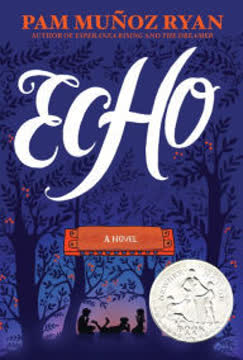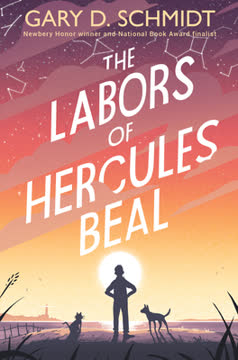Plot Summary
Ellie Saves a Newborn Puppy
In the early morning, Ellie defies her mother's expectations by saving a newborn puppy, Quiet, using cold water to revive him. This act of defiance and hope sets the tone for Ellie's character—determined, compassionate, and willing to challenge the status quo. Her connection with the puppy symbolizes her nurturing spirit and foreshadows her role as a healer in the story. The puppy becomes a symbol of life and resilience, mirroring Ellie's own journey on Echo Mountain.
Family's Struggle on Echo Mountain
The Great Depression forces Ellie's family to leave their town life behind and start anew on Echo Mountain. Her father, once a tailor, and her mother, a music teacher, struggle to adapt to the harsh realities of mountain life. The family faces hunger and hardship, but Ellie finds solace in the wilderness, unlike her mother and sister, who yearn for their past life. This chapter highlights the family's resilience and the contrasting ways they cope with their new reality.
Ellie's Connection with the Wilderness
Unlike her mother and sister, Ellie thrives in the wilderness, finding joy and purpose in the natural world. Her bond with her father deepens as they work together to build a new life. Ellie's affinity for the mountain and its creatures sets her apart from her family, creating a rift but also empowering her with a unique strength. Her connection to the land becomes a source of identity and resilience, shaping her journey and her role as a healer.
Father's Accident and Its Impact
A tragic accident leaves Ellie's father in a coma, altering the family's dynamics and thrusting Ellie into a role of responsibility. The accident, caused while saving her brother Samuel, leaves Ellie burdened with guilt and a determination to heal her father. This pivotal event tests the family's resilience and forces Ellie to confront her fears and limitations. Her father's condition becomes a catalyst for Ellie's growth and her quest to find unconventional ways to bring him back.
Ellie's Secret Carvings and Discoveries
Ellie discovers intricately carved wooden figures left for her in the woods, sparking her curiosity and leading her to a mysterious boy named Larkin. These carvings symbolize a connection to the unknown and a bridge between Ellie and the mountain's secrets. The carvings become a source of wonder and a catalyst for Ellie's journey of discovery, as she seeks to understand their origin and the boy who leaves them. This chapter deepens the mystery and Ellie's connection to the mountain.
Ellie's Determination to Heal Father
Driven by hope and desperation, Ellie experiments with unconventional methods to wake her father from his coma. She uses a mix of natural remedies and intuition, guided by a flame of determination within her. Despite her mother's skepticism, Ellie persists, believing in the power of her instincts and the mountain's wisdom. Her journey to heal her father becomes a metaphor for her own growth and resilience, as she learns to trust herself and the natural world.
Ellie's Encounter with the Mysterious Dog
Ellie encounters a wild, brindled dog that leads her to Cate, a reclusive woman living on the mountain. Cate, injured and in need of help, becomes a new focus for Ellie's healing instincts. The dog, Captan, symbolizes the wildness and mystery of the mountain, guiding Ellie to new challenges and connections. This encounter expands Ellie's world and introduces her to new allies and mysteries, deepening her bond with the mountain and her role as a healer.
Ellie Faces a Difficult Decision
Ellie is faced with a challenging decision when Larkin, a boy she has come to trust, needs her help. Despite the risks, she decides to assist him, demonstrating her bravery and commitment to those she cares about. This decision marks a turning point for Ellie, as she steps further into her role as a healer and protector on Echo Mountain. Her choice reflects her growing maturity and willingness to face danger for the sake of others.
Cate's Healing and Ellie's Growth
As Cate's health improves under Ellie's care, the bond between them strengthens. Cate shares her knowledge of natural remedies and healing, which Ellie eagerly absorbs. This relationship becomes a source of empowerment for Ellie, who gains confidence in her abilities. Cate's recovery symbolizes the healing power of community and the importance of passing down knowledge. Ellie's growth is evident as she takes on more responsibility and becomes a central figure in the mountain's healing process.
Larkin's Secret and Family Ties
Larkin's mysterious past is unveiled when he confesses that Cate is his grandmother. This revelation deepens Ellie's understanding of Larkin and the complexities of family relationships. The connection between Larkin and Cate highlights themes of legacy and the importance of family bonds. Ellie's acceptance of Larkin's secret demonstrates her empathy and ability to see beyond appearances, strengthening their friendship and her role as a unifying force on the mountain.
The Power of Music and Memory
As Ellie's father begins to recover, music plays a crucial role in his healing process. The sound of a mandolin, played by Ellie's mother, stirs memories and emotions, helping to awaken him from his coma. This chapter emphasizes the transformative power of music and its ability to connect people across time and space. The family's shared musical heritage becomes a source of strength and unity, illustrating the importance of cultural and familial ties.
A New Beginning on Echo Mountain
With her father's recovery and Cate's healing, Ellie looks to the future with renewed optimism. She reflects on her journey and the lessons learned, feeling more connected to the mountain and its people than ever before. This chapter marks a new beginning for Ellie, as she embraces her role as a healer and leader in her community. The story concludes with a sense of hope and possibility, as Ellie and her family prepare to face whatever challenges lie ahead.
Characters
Ellie
Ellie is a determined and empathetic young girl who embraces her role as a healer on Echo Mountain. Her journey is marked by courage and a deep connection to the natural world. As she navigates the challenges of mountain life, Ellie grows into a leader, inspiring those around her with her resilience and compassion. Her relationships with Cate and Larkin highlight her ability to see beyond appearances and foster meaningful connections.
Ellie's Father
Ellie's father, once a skilled tailor, becomes a catalyst for Ellie's growth and determination. His recovery is intertwined with the themes of music and memory, as the sound of a mandolin helps awaken him from his coma. His journey reflects the power of resilience and the importance of family support in overcoming adversity.
Ellie's Mother
Ellie's mother is a supportive and nurturing presence in the family, using music to connect with her husband and children. Her role as a teacher and musician highlights the importance of cultural and familial ties. Her journey reflects the challenges of adapting to change and the power of music to heal and unite.
Esther
Esther, Ellie's older sister, is practical and initially skeptical of Ellie's unconventional methods. Her journey reflects the tension between tradition and change, as she learns to embrace new ways of thinking. Esther's evolving relationship with Ellie highlights the importance of family support and understanding in times of crisis.
Samuel
Samuel, Ellie's younger brother, is a symbol of innocence and curiosity. His presence serves as a reminder of the family's vulnerability and the importance of protection. Samuel's trust in Ellie highlights her role as a protector and guide, deepening her sense of responsibility and love.
Cate
Cate is a knowledgeable and reclusive woman who becomes a mentor to Ellie. Her healing wisdom and connection to the mountain's natural remedies play a crucial role in the story. Cate's recovery symbolizes the power of community and the importance of passing down knowledge. Her relationship with Ellie is one of mutual respect and learning, as they both grow through their shared experiences.
Larkin
Larkin is a mysterious boy with a deep connection to the mountain and its secrets. His revelation that Cate is his grandmother adds depth to his character and highlights themes of family and legacy. Larkin's friendship with Ellie is based on trust and shared understanding, as they both navigate the complexities of their pasts. His skill as a carver symbolizes his ability to create beauty and meaning from the natural world.
Captan
Captan is a wild, brindled dog that symbolizes the wildness and mystery of the mountain. His loyalty and intelligence make him a key ally in Ellie's journey, embodying the spirit of the mountain and its creatures. Captan's presence highlights the theme of interdependence and the power of connection between humans and animals.
Plot Devices
The Carvings
The intricately carved wooden figures left for Ellie in the woods serve as a mysterious connection between her and Larkin. These carvings symbolize the unknown and the potential for discovery, guiding Ellie on her journey of exploration and growth. They represent the mountain's secrets and the bond between Ellie and the natural world, deepening the story's mystery and intrigue.
The Flame
The flame within Ellie symbolizes her determination and intuition, guiding her on her quest to heal her father and help others. This inner drive represents her connection to the mountain and her role as a healer, embodying hope and resilience. The flame is a metaphor for Ellie's growth and her journey toward understanding and acceptance.
Music and Memory
Music plays a crucial role in the story, serving as a catalyst for healing and connection. The sound of a mandolin helps awaken Ellie's father from his coma, illustrating the transformative power of music. This plot device highlights the importance of cultural and familial ties and the ability of music to transcend time and space.
The Mountain
Echo Mountain is more than a setting; it is a character in its own right, shaping the lives and journeys of those who inhabit it. The mountain's challenges and mysteries drive the plot, influencing Ellie's growth and her family's adaptation. It represents both hardship and healing, embodying the story's themes of resilience and transformation.
Healing and Natural Remedies
The use of natural remedies and healing methods is a central plot device, reflecting Ellie's growth and determination. Her journey as a healer is marked by courage and resourcefulness, as she learns from Cate and the mountain's wisdom. This plot device highlights the power of community and the importance of passing down knowledge.
Analysis
"Echo Mountain" by Lauren Wolk is a poignant exploration of resilience, healing, and the power of community. Set against the backdrop of the Great Depression, the story follows young Ellie as she navigates the challenges of mountain life, driven by a deep connection to the natural world and a determination to heal her comatose father. Through her journey, the novel highlights the importance of unconventional wisdom, the transformative power of music, and the strength found in familial and community bonds. The mountain itself serves as a character, embodying both hardship and healing, and shaping the lives of those who inhabit it. Wolk's narrative emphasizes the themes of growth, courage, and the enduring human spirit, offering readers a tale of hope and possibility in the face of adversity.
Last updated:
FAQ
Synopsis & Basic Details
What is Echo Mountain about?
- A girl's healing quest: Echo Mountain follows twelve-year-old Ellie, whose family is forced to relocate to a remote Maine mountain during the Great Depression after her father suffers a debilitating accident. Driven by a deep connection to the wilderness and an unwavering spirit, Ellie embarks on a determined quest to find unconventional ways to heal him.
- Survival and self-discovery: The narrative explores the family's struggle for survival in a harsh, isolated environment, contrasting Ellie's natural affinity for the wild with her mother and sister's longing for their former town life. Ellie's journey becomes one of profound self-discovery as she embraces her unique abilities and intuition.
- Unlikely mountain connections: Ellie's path leads her to forge unexpected bonds with a reclusive "hag" named Cate and a mysterious boy, Larkin, who help her unlock ancient wisdom and confront the complexities of healing, family, and belonging on Echo Mountain.
Why should I read Echo Mountain?
- Rich sensory immersion: Lauren Wolk's prose is deeply atmospheric, drawing readers into the tactile and sensory world of the mountain, from the smell of balsam sap to the feel of cold river water, creating a vivid and immersive reading experience. This detailed imagery enhances the themes of nature's healing power.
- Profound character development: The novel offers a nuanced exploration of resilience, grief, and transformation through its complex characters, particularly Ellie, whose internal struggles and unwavering determination to heal her family resonate deeply. Readers witness her evolution from a child burdened by guilt to a confident young healer.
- Timeless themes explored: Beyond its historical setting, Echo Mountain delves into universal themes of adaptation, the power of unconventional wisdom, the strength of familial bonds, and the enduring human spirit in the face of adversity, making it a compelling read for those seeking a story of hope and growth.
What is the background of Echo Mountain?
- Great Depression era hardship: The story is set in Maine in 1934, during the height of the Great Depression, which serves as the catalyst for the family's move from town to the isolated Echo Mountain. This historical context underscores the themes of economic struggle, self-sufficiency, and the drastic measures families took to survive.
- Rural self-reliance culture: The narrative deeply embeds itself in the culture of rural self-reliance, where families barter goods, hunt for food, and rely on traditional knowledge for survival and healing. This contrasts sharply with the family's previous urban life, highlighting the stark shift in their existence.
- Nature as a living entity: Echo Mountain itself is presented not merely as a setting but as a character, a wild and untamed force that both challenges and nurtures its inhabitants. The story explores the deep, almost spiritual connection some characters, like Ellie and Cate, have with the natural world and its ancient wisdom.
What are the most memorable quotes in Echo Mountain?
- "I loved the mountain. And I loved what it kindled in me. And that was that." (Chapter 3): This quote encapsulates Ellie's profound and unique connection to the wilderness, setting her apart from her mother and sister. It highlights her burgeoning sense of self and purpose, which the mountain nurtures, becoming a core aspect of her identity and resilience.
- "A person was more than just a body." (Chapter 59): This powerful statement, uttered by Ellie, reflects her deep understanding of healing that transcends physical ailments. It underscores the novel's central theme that true recovery involves emotional, spiritual, and relational well-being, not just the mending of flesh.
- "The brain's like the world. Every part of it has a way of doing things. But you won't know what you know until you know it." (Chapter 42): Cate's insightful observation about the brain, drawing a parallel to the vastness of the world, speaks to the novel's exploration of hidden knowledge, intuition, and the process of learning through experience. It emphasizes that understanding often comes through doing and discovery, rather than just formal instruction.
What writing style, narrative choices, and literary techniques does Lauren Wolk use?
- First-person, intimate narration: The story is told from Ellie's first-person perspective, offering an intimate and immediate connection to her thoughts, feelings, and sensory experiences. This narrative choice allows readers to deeply empathize with Ellie's journey of self-discovery and her unique perception of the world, enhancing the emotional depth of the Echo Mountain analysis.
- Lyrical, evocative prose: Wolk employs a lyrical and descriptive writing style, rich with sensory details and vivid imagery that brings the natural world of Echo Mountain to life. Her use of metaphor and simile, such as "the moon, beautiful in its bruises" (Chapter 3), creates a poetic atmosphere that underscores the beauty and harshness of the wilderness.
- Subtle foreshadowing and thematic echoes: The narrative masterfully weaves in subtle hints and recurring motifs, like the "flame" in Ellie's chest or the repeated phrase "if was quite a word," which foreshadow future events and deepen thematic connections. This technique encourages careful reading and rewards readers with layers of meaning, contributing to the rich themes in Echo Mountain.
Hidden Details & Subtle Connections
What are some minor details that add significant meaning?
- The "Keavy" mandolin's origin: The revelation that Ellie's mother's mandolin, named "Keavy," was crafted by Larkin's deceased father (Chapter 51) is a profound detail. It subtly connects the two families through shared artistry and loss, highlighting how music transcends their current divisions and foreshadows a potential for future harmony, linking to music and memory themes in Echo Mountain.
- Cate's "Girls Who Became Famous" book: Cate's mention of Florence Nightingale's story, particularly how she healed a sheepdog named Cap (Chapter 64), is a subtle callback to Ellie's initial act of saving Quiet and Captan's name. This detail reinforces the theme of innate healing ability and the idea that one's true calling can be revealed through compassionate action, deepening the Ellie character analysis.
- The significance of "if": The recurring phrase "if was quite a word" (Chapters 6, 14, 45) subtly emphasizes the pervasive uncertainty and the weight of hypothetical outcomes in the characters' lives. It highlights the constant internal negotiation between hope and despair, and the burden of choices made or not made, adding a layer of psychological depth to the narrative.
What are some subtle foreshadowing and callbacks?
- Ellie's "echo-girl" nature: Early in the book, Ellie describes herself as an "echo-girl" who feels the pain of others (Chapter 4), subtly foreshadowing her deep empathy and intuitive healing abilities. This trait is later manifested in her ability to understand animals and sense Cate's and Larkin's unspoken emotions, reinforcing her role as a natural healer in Echo Mountain.
- The doctor's locket payment: The detail that Ellie's mother paid the doctor with her silver locket (Chapter 7) for his ineffective treatment of her father foreshadows the family's desperation and the limitations of conventional medicine. It sets up the later contrast with Ellie's unconventional, effective methods and Cate's wisdom, highlighting the theme of alternative healing in Echo Mountain.
- Captan's "singing" and barking: Captan's initial silence, broken only by howls and growls, and his later "singing" to Ellie's mother (Chapter 69) subtly foreshadows his role in awakening her musical spirit and, consequently, her father. His bark, which finally rouses Ellie's father, is a powerful callback to the idea that strong, even jarring, stimuli can be necessary for profound change, linking to Captan symbolism.
What are some unexpected character connections?
- Cate as Mrs. Cleary: The revelation that Cate, the reclusive "hag," is actually Mrs. Cleary, the kind nurse from Bethel who once treated Esther's earaches (Chapter 49), is a significant and unexpected connection. This twist challenges initial perceptions and highlights themes of identity, transformation, and the enduring impact of kindness, enriching Cate's character study.
- Captan as Quiet's father: The subtle suggestion that Captan, Cate's wild dog, is the sire of Maisie's puppies, including Quiet (Chapter 57), creates an unexpected familial link between the wild mountain and Ellie's domestic life. This connection reinforces the idea of interconnectedness and the blending of different worlds, adding depth to Captan symbolism and the bond between Ellie and Quiet.
- Larkin's father as the mandolin maker: The discovery that Larkin's deceased father was the luthier who crafted Ellie's mother's beloved "Keavy" mandolin (Chapter 51) establishes a poignant, unseen bond between the two families. This shared heritage through music and craftsmanship underscores themes of legacy, loss, and the unexpected ways lives intertwine on Echo Mountain.
Who are the most significant supporting characters?
- Captan, the loyal guide: Captan, Cate's brindled dog, is far more than a pet; he acts as a silent, intuitive guide for Ellie, leading her to Cate and later communicating distress through his "singing" and barking. His loyalty and wild wisdom are crucial to the plot, symbolizing the mountain's untamed spirit and the deep, unspoken bonds between humans and animals, central to Echo Mountain character analysis.
- Larkin, the hidden carver: Larkin, initially the mysterious carver of wooden gifts, becomes Ellie's confidant and a key helper in Cate's healing. His quiet strength, artistic talent, and deep connection to his grandmother and the mountain's history make him a vital character who mirrors Ellie's own journey of self-discovery and acceptance, exploring Larkin motivations.
- Esther, the evolving sister: Esther, Ellie's older sister, initially represents the family's resistance to mountain life and harbors resentment towards Ellie. However, her journey reveals her own fears and capacity for kindness, particularly when caring for Cate. Her transformation highlights the complexities of sibling relationships and the slow, often painful process of adaptation and empathy, adding depth to Esther character development.
Psychological, Emotional, & Relational Analysis
What are some unspoken motivations of the characters?
- Ellie's guilt and responsibility: Ellie's relentless pursuit of her father's healing is deeply motivated by her unspoken guilt over the accident, believing she was indirectly responsible for Samuel being in harm's way (Chapter 14). This internal burden drives her to extreme measures, as she feels compelled to "fix" what she perceives as her fault, a key aspect of Ellie motivations.
- Esther's longing for the past: Esther's constant complaints and desire to return to town stem from a profound sense of loss and a struggle to adapt, which she expresses through anger and blame. Her unspoken motivation is a desperate yearning for the comfort, familiarity, and social structure of their old life, which she believes was unjustly taken from her, impacting Esther character development.
- Mother's protective fear: Ellie's mother's initial resistance to Ellie's unconventional healing methods and her desire to keep her children "tame" are rooted in a deep, unspoken fear of further loss and the unpredictable nature of the mountain. Her motivation is to protect her remaining family from the wildness that has already caused so much pain, influencing her decisions in Echo Mountain.
What psychological complexities do the characters exhibit?
- Ellie's "two-ness": Ellie grapples with a complex internal duality, describing herself as "two opposite things at the same time" (Chapter 4)—a skilled woods-girl and an "echo-girl" who feels the pain of others. This psychological complexity allows her to navigate both the practical demands of survival and the emotional nuances of healing, making her a uniquely empathetic and effective protagonist in Echo Mountain analysis.
- Mother's identity crisis: Ellie's mother experiences a profound psychological shift, feeling like "a stranger in this new skin" (Chapter 46) after leaving town. Her inability to sing or play the mandolin reflects a loss of her former identity as a music teacher and a struggle to find joy and purpose in the harsh mountain life, showcasing the psychological impact of the Great Depression.
- Larkin's quiet grief and isolation: Larkin's reserved nature and his secret gift-giving reveal a deep-seated loneliness and unresolved grief over his father's death. His psychological complexity lies in his quiet observation and artistic expression, using his carvings as a way to connect without direct interaction, reflecting the isolation and emotional burdens of mountain life, central to Larkin motivations.
What are the major emotional turning points?
- Father's first groan: The moment Ellie's father groans after the bee stings (Chapter 59) is a pivotal emotional turning point, offering the first tangible sign of his awakening after months of silence. This brief sound ignites a powerful surge of hope and validation for Ellie, reinforcing her belief in her unconventional methods and fueling her determination.
- Mother's mandolin playing: When Ellie's mother finally picks up and plays her mandolin, "Keavy," after Captan's insistent "singing" (Chapter 69), it marks a significant emotional breakthrough. This act symbolizes her return to her true self, her acceptance of the mountain's wildness, and a profound release of pent-up grief, creating a moment of collective healing and joy for the family.
- Esther's recognition of Mrs. Cleary: Esther's emotional breakthrough upon recognizing Cate as Mrs. Cleary, the kind nurse from her childhood (Chapter 49), is a powerful turning point. It shatters her rigid perceptions, allowing her to shed her resentment and embrace empathy, transforming her relationship with Cate and, implicitly, with Ellie, highlighting the themes in Echo Mountain of forgiveness and understanding.
How do relationship dynamics evolve?
- Ellie and Mother's shifting bond: Initially strained by Ellie's wildness and the mother's grief, their relationship evolves from conflict to mutual understanding and respect. The mother's gradual acceptance of Ellie's healing methods and her own return to music signify a softening and a deeper appreciation for Ellie's unique strengths, transforming their dynamic from opposition to partnership.
- Esther's journey from resentment to empathy: Esther's relationship with Ellie is marked by initial resentment and blame, particularly regarding their father's accident. However, her experience caring for Cate and witnessing Ellie's unwavering compassion slowly erodes her hardened exterior, leading to moments of genuine empathy and a renewed sisterly bond, showcasing Esther character development.
- Cate and Larkin's intergenerational healing: The relationship between Cate and Larkin is one of deep, unspoken love and mutual reliance, where Larkin cares for his grandmother and learns her healing ways. Their bond, rooted in shared grief and mountain wisdom, highlights the importance of legacy and the quiet strength found in intergenerational connections, providing a powerful counterpoint to the family's initial struggles.
Interpretation & Debate
Which parts of the story remain ambiguous or open-ended?
- Father's full cognitive recovery: While Ellie's father awakens and begins to speak, the extent of his long-term cognitive and physical recovery remains somewhat ambiguous. Cate warns that he "may be . . . different now. Not quite who he was before. And he may not remember some things" (Chapter 42), leaving the reader to ponder the lasting impact of his coma and the challenges still ahead for his full rehabilitation.
- The future of the mountain community: The story concludes with a sense of hope and new beginnings, but the long-term integration of Cate and Larkin's family with Ellie's community is left open. The lingering prejudices (e.g., Mrs. Lockhart's suspicion, Larkin's mother's anger) suggest that true acceptance and unity will be an ongoing process, reflecting the complexities of community building in Echo Mountain.
- The nature of Ellie's "gift": The source of Ellie's intuitive healing abilities and her deep connection to animals and nature is never explicitly explained. It's presented as an innate quality, a "flame" within her, leaving it open to interpretation whether it's a mystical gift, heightened empathy, or simply a profound attunement to the natural world, adding to the Ellie character analysis.
What are some debatable, controversial scenes or moments in Echo Mountain?
- Ellie's "shock therapy" for her father: Ellie's repeated attempts to rouse her father using jarring methods—dunking him in cold water, putting a snake in his bed, and applying bee stings to his temple—are highly debatable. While ultimately effective, these actions are portrayed as reckless and potentially harmful by her family, prompting readers to question the ethics of her desperate measures versus the desperate need for a cure, a key point in Echo Mountain analysis.
- Ellie taking blame for the accident: Ellie's decision to shoulder the blame for her father's accident, protecting Samuel and Esther (Chapter 14), is a controversial act of self-sacrifice. While noble, it leads to her isolation and the family's resentment, raising questions about the long-term psychological cost of such a burden and whether honesty, however painful, might have been a healthier path.
- The "hag" label and its implications: The community's labeling of Cate as a "hag" and the fear associated with her, despite her being a kind, knowledgeable nurse, is a controversial portrayal of prejudice. It sparks debate about how fear and misunderstanding can demonize those who are different or possess unconventional wisdom, highlighting themes of societal judgment versus individual truth in Echo Mountain.
Echo Mountain Ending Explained: How It Ends & What It Means
- Father's awakening and memory's return: The novel culminates with Ellie's father fully awakening, his memory of the accident returning, and his explicit exoneration of Ellie ("Not Ellie," Chapter 70). This signifies not just physical healing but also emotional and relational restoration within the family, as the burden of blame is lifted and understanding begins to mend fractured bonds. This is a crucial part of the Echo Mountain ending explained.
- The final carving and shared purpose: The discovery of Larkin's new carving—a figure of himself placed next to Ellie's (Chapter 73)—symbolizes the deepening of their friendship and a shared future purpose. It represents mutual recognition, acceptance, and the promise of collaboration in their roles as healers and caretakers of the mountain, suggesting a new generation embracing its unique path.
- Ellie's realization: "doing one thing was doing everything": Ellie's profound realization that "doing one thing was doing everything" (Chapter 73) encapsulates the novel's core message. It means that every act of kindness, every effort to heal, every step towards understanding, no matter how small or seemingly isolated, contributes to a larger, interconnected web of well-being and growth, affirming the transformative power of compassion and resilience in Echo Mountain themes.
Review Summary
Echo Mountain receives mostly positive reviews for its beautiful writing, vivid setting in Depression-era Maine, and compelling characters, especially 12-year-old Ellie. Readers praise Wolk's lyrical prose and themes of resilience, healing, and connection to nature. Some criticize the slow pacing and repetitive elements. The book is noted for its historical details and emotional depth, though a few found it tedious or unrealistic. Overall, it's highly recommended for its heartfelt storytelling and rich character development.
Download PDF
Download EPUB
.epub digital book format is ideal for reading ebooks on phones, tablets, and e-readers.









